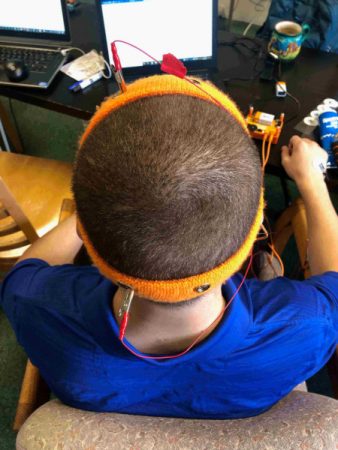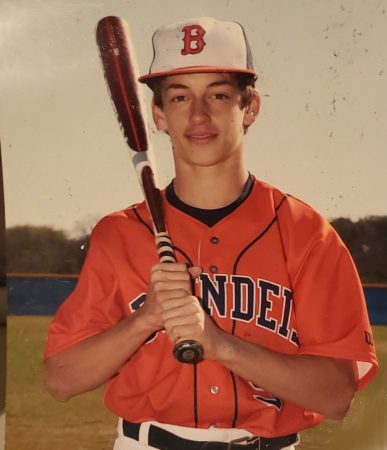
—Written by Samuel Kuhn—
This summer I am lucky enough to get to work with Backyard Brains on a project that pulls together neuroscience, computer engineering, philosophy, and philanthropy. This summer I am trying to build a device to detect free will!
To even try and define free will, we must turn to the humanities for help. Free will is the ability to choose something for yourself. Philosophers have long debated whether or not we even have this free will, but all the ancient debates about free will are simply speculation. (Are we even free enough to be able to fathom such a thing as free will? You get the point!)
It is only in about the last 50 years that neuroscience has begun to record electrical signals that can offer some insight into this debate on free will. In the ‘60’s, a couple of researchers, Kornhuber and Deecke, did some experiments in which a participant was to use their free will to make a right arm movement whenever they chose to do so. By recording the electrical activity (EEG) in the participant’s brain while they used their free will, Kornhuber and Deecke were able to show that there is an electrical signature that is specific to free will based movements. This means that our brain seems to show signs of deciding to move even before we feel like we want to move. Later experimenters, from Libet to previous BYB fellows, have confirmed the existence of this phenomenon.
These findings are so remarkable because they show that some activity in our brain seems to predict when we are going to act. How can we be responsible for an action that our brain set us up to perform before we ever decided to act? In the same way, how can someone else be responsible for something bad they did if their brain made them do it before they decided to act?
I’m not trying to say that we NEVER decide on what we do, but maybe we can gain a deeper sense of empathy for how we are all victims of circumstance to some degree. None of us choose where or when we are born. None of us choose our genetics. None of us choose the way the world will treat us, so when the world sets us up to act before we ever get a chance to make a choice, maybe we are deserving of a bit more forgiveness than we previously thought. Maybe, in light of this information, we can be a bit more forgiving too!
Back to the neuroscientific part of debate!
As of right now, I am struggling to replicate the readiness potential. This is a bit frustrating, because previous BYB fellows were able to do this with the same equipment available to me. This has made it very hard to identify at what stage in my recording process the error is manifesting.
Honestly, it would have freaked me out if I didn’t know that the scientific process is about undoing what you did wrong or unraveling what doesn’t work: identifying and locating the errors you made, rooting out their cause, figuring out the right direction! The error could be something wrong with my analysis code, the hardware I am using, the way I am running the experimental protocol, my personal-use brain, or even the scientific literature itself (this last one is pretty unlikely though). Floating in this sea of possibilities feels uncomfortable. I don’t know which way to turn, but I have faith in the scientific process. I believe that if I take the time to analyze each and everyone of these possible error explanations, I will find the broken link in the chain and I’ll blow minds yet!
My plan for doing this comes in 3 phases. The first phase involves finding the white whale (readiness potential) in a scientific setting. Once I have completed this first phase, I will move on to trying to spot the readiness potential in real-time using an Arduino and TinyML. Once I accomplish both of these tasks, I am going to optimize my hardware, software and experimental protocol to make this project totally accessible to anyone who wants to get to know their own free will at a deeper level.
But before I wrap up for today, let me provide a bit of a background and explain how I came up with this research project idea.
Ever since I was old enough to speak, I have been thinking about one question: Why? Why do we stand on the ground instead of the ceiling? Why does water come out of the sink instead of cotton candy? Asking questions and searching for answers has been central to me as a person for as long as I can remember. However, as I’ve grown up, these questions have become more and more focused on wanting to help people. In all the thinking I have done, the most important question I have come across has been “Who am I?”. If we could all understand ourselves a bit better as people, I think this would go a long way towards fixing all the problems we face in our lives. This is why I love neuroscience, because it lets me explore this question and help to give answers to people across the vast reaches of science, including YOU.

Although I have come a long way, I wasn’t always this person. Once upon a time I was just a wide-eyed baseball player (see picture above!) in San Antonio, Texas with dreams of playing in the pros. As I got older and realized I wanted to pursue something bigger than baseball, I didn’t know what to do so I decided to study something I couldn’t go wrong with my freshman year of college; computer engineering.
This year gave me a good set of skills in basic programming as well as the mental space to learn about the exciting developments happening in the world of neuroscience, specifically brain computer interfaces like the ones made possible by Backyard Brains and other emerging companies. With this new passion in mind, I transferred to a school where I could study neuroscience with the hope of one day building BCI of my own. Even though I love this work, I still try to maintain a life apart from science. Whether things are going great or terrible at work, I try to go to a jiu-jitsu class at least once a week to keep my mind clear. I also like to write, so getting lost in the novel I’m working on tends to offer some unwavering peace too.
About Me
I am a 2021 graduate with a degree in Neuroscience and a minor in Mathematics.
I was born and raised in San Antonio, Texas where I played competitive baseball and earned a 3rd Degree black belt in Tae Kwon Do. Through my academics and professional career I hope to make an impact on the development of Brain-Computer Interface, specifically language prostheses.